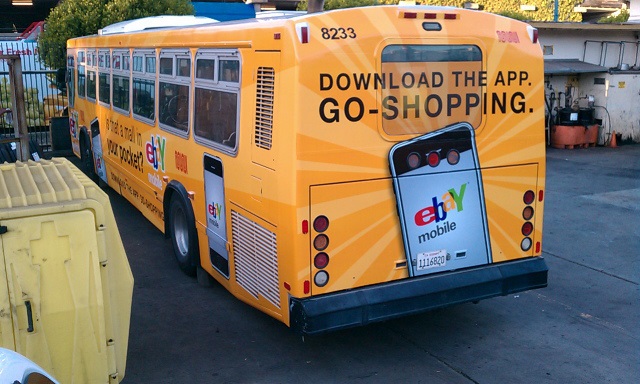By Kevin Bard
With all of the recent pitfalls and controversies that BART and Muni have to juggle on a continual basis (do they even need mentioning?), it seems peculiar that a handful of BART’s Board of Directors would pick now to resurrect a losing idea from last year: the system-wide instillation of digital billboards, changing every eight seconds for the riders’ amusement. Add to this, a similar plan by the same company to mount digital ads on the sides of some SF buses and advertising “wraps” on the sides of others.
What could possibly go wrong?
Let’s take BART first.
In 2013, the transit agency wisely rejected a similar proposal from a contractor named Titan, but now Titan is at it again, ready, willing, and able to monetize on a captive audience: the passengers. Glance at how Titan wants us to pander to its corporate clientele here if so inclined. How can BART stations even pretend to be an indispensable community asset with this sort of philosophy nipping at its heels?
Unfortunately, as we all know by now, the San Francisco Municipal Transportation Agency’s budgetary process is obscure and unaccountable at best, which begs the question, why aren’t MTA directors elected like at BART directors?” (But let’s save that brainteaser for another time.)
Currently, the Board of Supervisors Budget and Finance Committee is reviewing a Titan ad contract that calls for twelve-foot long digital billboards on the sides of 200 buses and would double the amount of unattractive ad wraps, turning an already insufferable traveling experience into a hyper-commercialized folly on wheels.
San Francisco voters have said no to the idea of new billboards not once but four times at the ballot box, even though it meant lower revenue streams. Take 2009’s Proposition D for example. The voters sided against the idea of digital billboards across the Mid-Market area, despite a 20-to-1 fundraising edge from the Yes side.
Digital advertisements sacrifice transit riders on an altar made of chump change. The prospective revenue will only generate enough money to keep Muni buses running two days out of an entire year and BART trains for a paltry 11 hours a year. These ads deliver specious, meaningless infotainment at the expense of vital transit data that all riders depend on.
Houston and Honolulu disallow advertisements on their transit systems. Why is the Bay Area lagging behind?
Muni’s Titan contract will be Item #9 at a hearing of the full Budget and Finance Committee, beginning at 10:30am Wednesday, May 14 at City Hall. Show up and be heard. Supervisor John Avalos has been leading the charge against these ad proposals.
The BART digital platforms proposal is set to be heard at 5pm on Thursday, May 22nd. (Here is a somewhat handy link with more details.) In the meantime, take a look at the pilot display panel on the Montgomery Station platform and judge for yourself. But for your own sanity, don’t stare too long.




